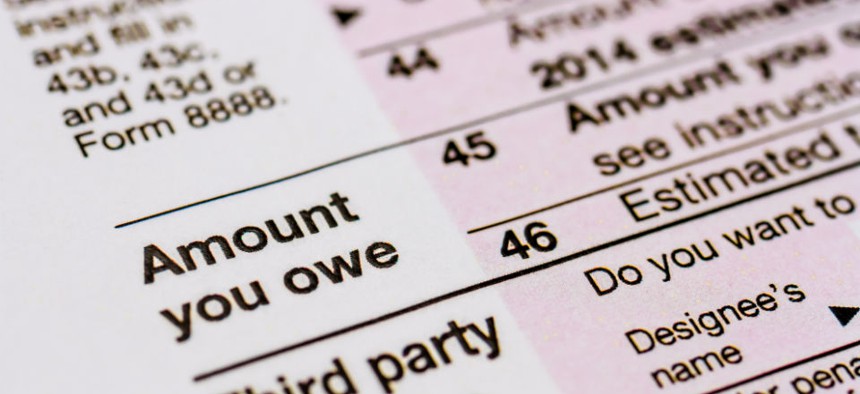
Teri Virbickis / Shutterstock.com
Bill Allowing Uncle Sam to Fire Federal Tax Cheats Resurfaces
A House panel advanced the legislation, unpopular with many feds, on Wednesday.
Federal employees and contractors who cheat on their taxes would be out of a job under two bills approved Wednesday by a House panel.
H.R. 1563, sponsored by House Oversight and Government Reform Committee Chairman Rep. Jason Chaffetz, R-Utah, would allow agencies to fire federal employees who fail to pay their taxes and have not entered into an agreement with the government to repay the debt. This is at least the third time Chaffetz has introduced the legislation, which many Democrats and federal employees oppose. The bill also would prohibit the government from hiring job applicants with seriously delinquent tax debt. Under current law, Internal Revenue Service employees can be fired for failing to pay their taxes.
“If you are legitimately trying to pay your taxes, if you are trying to go through the process, if you are disputing what the IRS is saying and going through the adjudication process, of course we are not going to terminate you, or penalize you,” Chaffetz said during the markup, which featured a lively debate on H.R. 1563. “The overwhelming majority – it’s not even close – the overwhelming majority of people who work at the federal government – they are good, honest, decent, hard-working, patriotic people who do the right thing. We are not talking about those. We are talking about the people who are the bad apples.”
According to federal data, about 97 percent of federal workers pay their taxes, compared to a 91 percent compliance rate for the general public.
H.R. 1563 also would allow agencies to discipline federal employees for intentionally failing to file a tax return, or intentionally under-reporting their income.
The bill would provide due process for affected individuals, who would have 180 days to demonstrate that their debt meets one of the legislation’s included exemptions.
The IRS on Tuesday released its annual report on tax delinquency among federal civilian and military employees and retirees, as well as legislative branch employees. Civilian employees owed $1.1 billion in back taxes in 2014, up slightly from 2013, and the tax delinquency rate among that group was 4 percent in 2014, about the same as in 2013. The overall tax delinquency rate among federal civilian and military employees and retirees fell slightly from 2013 to 2014, from 3.3 percent to 3.1 percent. The tax delinquency rate in the legislative branch, including members of Congress, was higher than the executive branch. The House tax delinquency rate in 2014 was 5.04 percent; the Senate rate was 3.5 percent.
Chaffetz said he would put forward a bill soon dealing with tax cheats in the legislative branch, calling Congress “one of the worst offenders.”
Committee Democrats spoke out against H.R 1563, saying it was yet another attack on federal workers, and calling it unnecessary because of wage garnishment and the Federal Payment Levy Program. Under the levy program, the IRS can impose a continuous levy on federal salaries and pensions up to 15 percent until the debt is paid, and all feds are automatically subject to it if they fail to pay their taxes. Some agencies do garnish the wages of tax-delinquent federal employees, but not all do, or can, according to Chaffetz. Cummings said the IRS has collected more than $5 billion in delinquent taxes since 2000 under the levy program, citing IRS data.
“I do not see a problem with the federal government’s ability to recover delinquent taxes from federal employees,” Cummings said. “So, I do not understand why we are considering a change in the law to fix a problem that does not exist. Clearly, this legislation is designed to punish federal employees rather than to help the government recoup delinquent taxes.” Cummings also noted for the record that the National Treasury Employees Union opposed the bill.
Rep. Gerry Connolly, D-Va., said the legislation was “not well-received” by federal workers, who view it as an attack. Chaffetz emphasized that he “greatly appreciates” federal workers, and that H.R. 1563 was not intended to disparage the group.
The discussion over the bill (H.R. 1562) prohibiting seriously tax delinquent federal contractors and grantees from doing business with the government was much less contentious, securing bipartisan support. The legislation prohibits the award of contracts or grants to corporations or individuals with seriously delinquent federal tax debt. “These contractors who don’t play by the rules should be held accountable,” said Chaffetz, who has introduced the bill before.
The chairman said he got the idea for H.R. 1562 from President Obama, who sponsored a similar bill in 2007 when he was in the Senate.
(Image via Teri Virbickis / Shutterstock.com)







